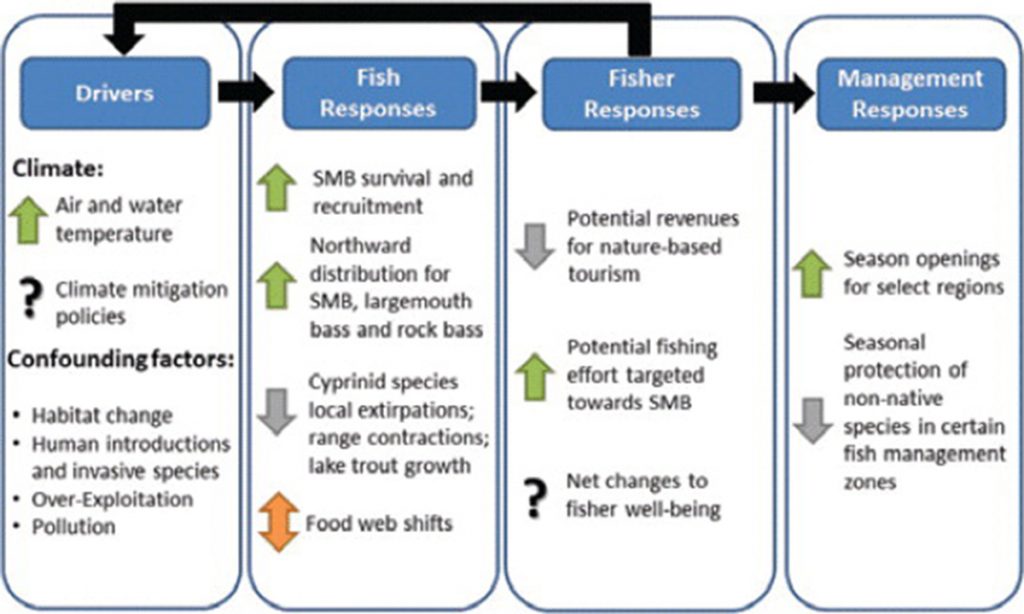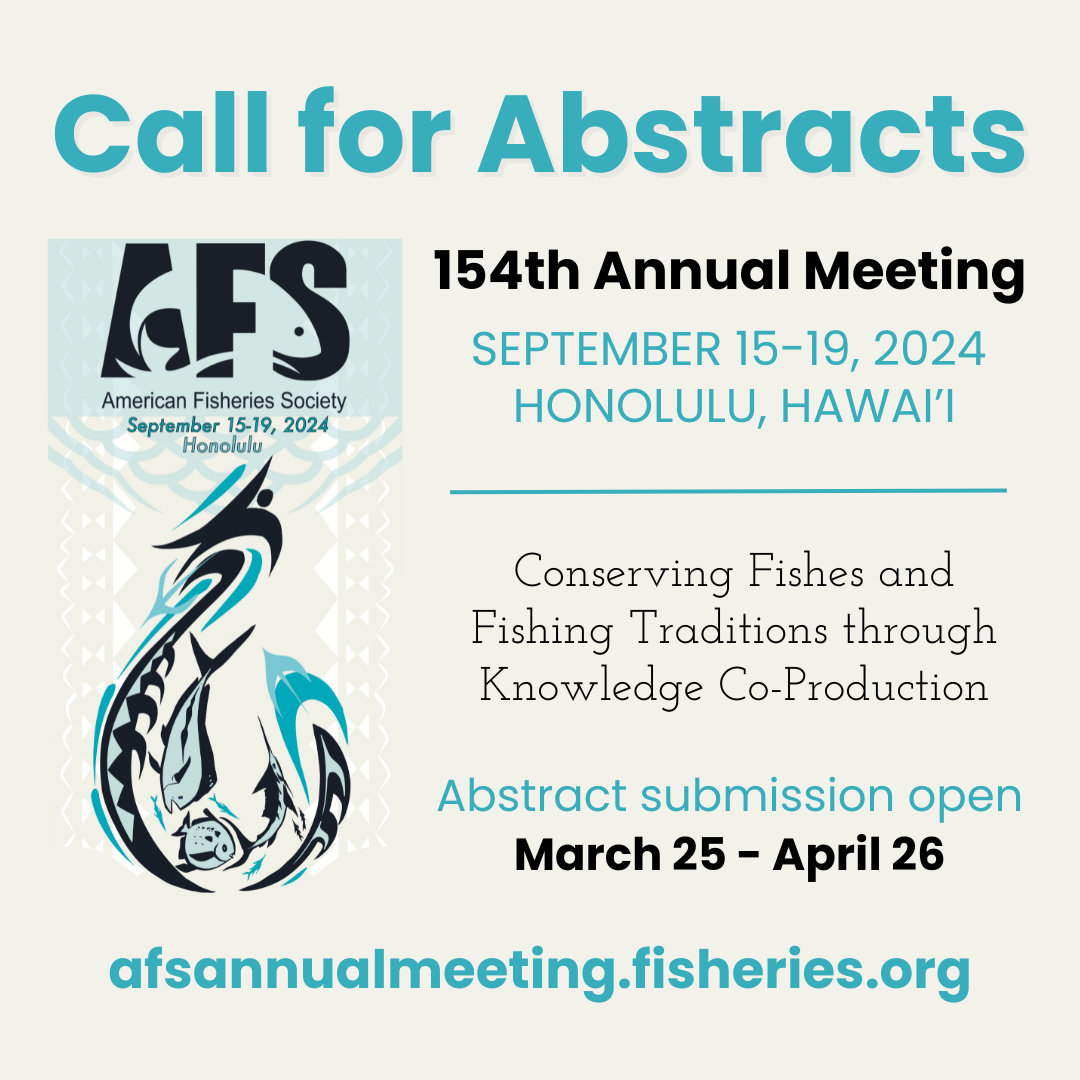Introduction to the Special Issue
To sustainably manage North American fishes, understanding how climate change will impact, and is currently impacting, these ecologically, culturally, and economically valuable resources is a critical need. Because the effects of climate change on fishes vary by ecoregion and interact with other anthropogenic stressors, synthesis of available information on the impacts of climate change on inland fishes at a continental scale is useful to their conservation and management.
Therefore, the American Fisheries Society solicited assistance from the U.S. Geological Survey’s (USGS) National Climate Change and Wildlife Science Center Chief Doug Beard to develop a special issue on climate change for Fisheries. This initial discussion led to a collaboration with the National Climate Change and Wildlife Science Center and the USGS Missouri Cooperative Fish and Wildlife Research Unit to develop the special issue. As team leads, we convened an expert workshop in June 2015 at the USGS Northern Rocky Mountain Science Center in Bozeman, Montana, to examine the effects of global climate change on inland fishes and fisheries in the United States and Canada. The 30 experts were selected based on their expertise in climate change, fish ecology, and/or human dimensions and were from academia (9), state/provincial governments (8), and federal agencies (13) throughout the United States and Canada. The aim of the workshop was to summarize the current state of knowledge, identify data gaps, and suggest future research directions around four major themes dealing with climate-related impacts on fishes and fisheries:
• Individual-level responses (e.g., physiology, growth)
• Population- and assemblage-level changes (e.g., range shifts, biotic interactions)
• Human dimensions (e.g., recreational fishing)
• Management and adaptation to climate change (e.g., riparian planting, improved connectivity).
Ectothermy in North American inland fishes makes them vulnerable to climate-induced temperature change (see Whitney et al., this issue). Climate-related deviations from optimal temperatures and salinity may result in chronic stress that challenges the neuroendocrine and osmoregulatory systems of fishes, alters cardiorespiratory performance and aerobic scope, and elicits hyperactive or suppressive immune responses. Temperature and salinity changes will occur in environments with other anthropogenic stressors, but the physiological consequences of interacting stressors are poorly known and are in need of further investigation.
Climate change acts as both a direct and indirect driver of change at the fish population and assemblage levels in inland systems (see Lynch et al., this issue). Thirty-one peer-reviewed research publications between 1985 and 2015 document observed impacts of climate change on North American inland fishes, primarily associated with changes in phenology and distribution. However, more research is necessary to groundtruth projected changes in fish, to provide broader geographic and taxonomic representation, to increase understanding sources of (and enhancers of) resilience to change and interactions among confounding stressors, and to develop accessible decision-support tools.
There are likely three pathways in which climate change may affect inland recreational fisheries in North America (see Hunt et al., this issue). The first pathway suggests that climate change may affect fish populations and habitats, which will indirectly affect fishers. Climate change may also change environmental conditions that directly affect fishers. For example, increased air temperature in northern regions will likely extend the open water fishing season, possibly increasing fishing effort. Lastly, mitigation and adaptation strategies, such as energy policies that may result in higher fuel costs, may affect inland recreational fishers because of increased travel costs to fishing destinations. However, there is limited research on how these three pathways combine to affect fishers.
With possible changes to fish physiology, fish populations and assemblages, and fishers, management agencies have a challenge to adapt management in the long term to a changing climate while balancing short term management goals (see Paukert et al., 2016). However, managers can often use traditional approaches (e.g., harvest regulations, habitat management) to tackle novel issues associated with climate change. However, managing for a resilient ecological system may require strategies to increase age structure of populations to minimize possible boom-and-bust recruitment cycles or provide a diversity of species for fishers to use. Paukert et al. (this issue) provide examples of how agencies are using monitoring data to make decisions to create resilient ecological systems and how forward-thinking management structures can increase agency capacity to understand and manage for natural resources in a changing climate.
The range expansion of Smallmouth Bass Micropterus dolomieu in Ontario provides an example that links the four themes of this issue (Figure 1). Populations are expanding northward because environmental conditions are more suitable to their physiology. The invasion of Smallmouth Bass in these new areas can disrupt native food webs, impact assemblages of resident fishes, and create new opportunities for recreational fishing. The ecological consequences of Smallmouth Bass expansion into new lakes present opportunities and challenges for fisheries managers in Ontario because many anglers desire to catch Smallmouth Bass, which require new management techniques (e.g., catch-and-release bass fishing negates liberal bag limits as a harvest management tool), but managers still have responsibilities to maintain the native coldwater fish communities. The management process will likely be an exercise in managing expectations of the stakeholders for fisheries changing with climate change.

We hope you enjoy the issue. Please feel free to contact us directly with any questions or comments.
Guest Editors:
Craig P. Paukert | U.S. Geological Survey, Missouri Cooperative Fish and Wildlife Research Unit, Department of Fisheries and Wildlife Science, University of Missouri, Columbia. E-mail: [email protected]
Abigail J. Lynch | U.S. Geologial Survey, National Climate Change and Wildlife Science Center, Reston, VA.
E-mail: [email protected]
In collaboration with: James E. Whitney | Missouri Cooperative Fish and Wildlife Research Unit, Department of Fisheries and Wildlife Sciences, University of Missouri, Columbia, MO
*Present address for James E. Whitney: Department of Biology, Pittsburg State University, Pittsburg, Kansas
REFERENCES:
Hunt, L. E., P. Fenichel, D. C. Fulton, R. Mendelsohn, J. W. Smith, T. D. Tunney, A. J. Lynch, C. P. Paukert, and J. Whitney. This issue. Identifying alternate pathways for climate change to impact inland recreational fishers. Fisheries 41:362–373.
Lynch, A. J., B. J. E. Myers, C. Chu, L. A. Eby, J. A. Falke, R. P. Kovach, T. J. Krabbenhoft, T. J. Kwak, J. Lyons, C. P. Paukert, and J. Whitney. 2016. Climate change effects on North American inland fish populations, assemblages, and aquatic communities. Fisheries 41:346–361.
Paukert, C. P., B. Glazer, G. J. A Hansen, B. Irwin, P. C. Jacobson, J. L. Kershner, B. Shuter, J. Whitney, and A. Lynch. 2016. Adapting inland fisheries management to a changing climate. Fisheries 41:374–384.
Whitney, J. E., R. Al-Chokhachy, D. B. Bunnell, C. A. Caldwell, S. J. Cooke, E. J. Eliason, M. Rogers, A. Lynch, and C. Paukert. 2016. Physiological basis of climate change impacts on North American inland fishes. Fisheries 41:332–345.
Members click below for the July 2016 Fisheries magazine’s complete issue. Non-members, join here.
This content is for members only. Please login.






